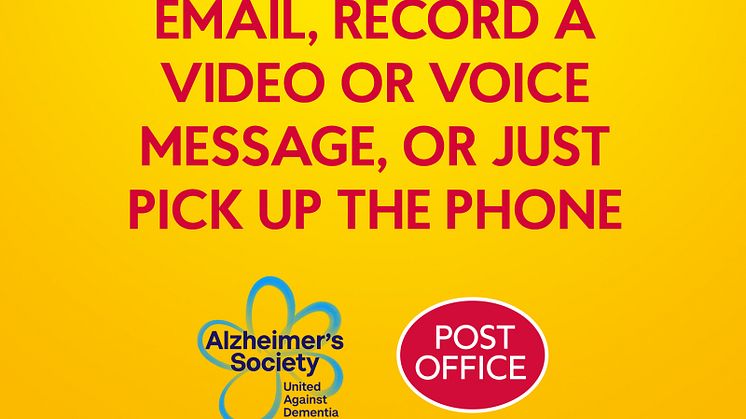
Press release -
Post Office and Alzheimer’s Society launch new Reminisce Remotely campaign ahead of VE Day
A new campaign has been launched by the Post Office and Alzheimer’s Society to get people to keep in touch with each other and to reminisce remotely ahead of the 75th anniversary of VE Day on Friday.


Alzheimer’s Society is concerned about how social isolation is increasing the symptoms of dementia for people affected. Increased isolation, compounded by the confusion of a change to daily routine, means that people with dementia are facing unprecedented challenges during the coronavirus pandemic – many of them feeling very alone. One study shows that loneliness and isolation can advance cognitive decline for people with dementia by up to 20%.*
However, it’s not just older people and those living with dementia who can be affected; people across society are at risk of being lonely and out of touch with friends and family.
The new campaign encourages different generations within families to get in touch with isolated people in their lives and discuss shared experience between the current coronavirus pandemic, and to hear from the older generation how society recovered in the years following the end of World War Two. The campaign calls on people to write, phone, email and record video and voice messages with each other.
Nick Read, Post Office Chief Executive, said:
“Loneliness can have serious impacts on a person’s health and wellbeing. As a business, we are all about keeping people connected and there are so many ways to keep in touch with friends and family today. As we approach the 75th anniversary of VE Day, we are calling on younger generations to get in touch with older relatives and family friends to discuss their experience of World War Two and how life has changed over the years. We are stronger together and community has never been as important as it is now.”
Kate Lee, Chief Executive, Alzheimer’s Society, said:
“We are delighted to partner with the Post Office to raise awareness of the loneliness and isolation people with dementia can experience, especially during this current crisis. Coronavirus has had an unprecedented impact on us all, but for people with dementia, the situation is even more serious. Some people are struggling to get essential care, confused by losing their much-needed routines, with their symptoms increasing and health deteriorating because of a lack of social contact. Carers are also feeling isolated and struggling to get respite. Our Dementia Connect support line receives thousands of calls, and we need urgent donations now to increase telephone and virtual support for people with dementia to make sure they know they aren’t alone.
“This VE Day project is a fantastic way for people across the UK to share their history, connect with those who are isolated, and come together, no matter what generation you come from.”
Post Office and Alzheimer's Society advice for keeping in touch
Dementia can affect an individual’s cognitive ability. As dementia advances, verbal communication can sometimes become a challenge. Writing a letter or an email can be a positive way to encourage to people to communicate and share important experiences. For people living with dementia, long term memories are often the most resilient. Letters and emails are a brilliant way to ask questions you’ve never asked before.
For those that are able, technology means it’s easy to share voice and video messages with loved ones and seeing a friendly face or hearing a familiar voice can make a big difference to someone who’s feeling cut off. As the 75th anniversary of VE Day approaches, now is a great time to get in touch and share a video asking older people about their experiences of World War Two and the recovery effort following the war.
With thousands of people shielding and missing out on social contact, this can impact people’s health. Pick up the phone to a grandparent or a family friend and talk about what they remember from life after World War Two.
Tips on how to support someone with dementia to communicate, and advice on how to provide support through this pandemic can be found at www.alzheimers.org.uk

Images from the campaign will be shared on the Post Office and Alzheimer’s social media platforms.
* https://www.ncbi.nlm.nih.gov/pmc/articles/PMC5102822/
A VE day Toolkit produced by the UK Government is available to download.
Categories
About the Post Office
- With over 11,500 branches, the Post Office network is the biggest retail network in the UK, with more branches than all the banks and building societies combined.
- 98% of Post Office branches are run with retail partners on an agency or franchise basis.
- The Post Office provides services central to peoples’ everyday lives; 99.7% of the population lives within 3 miles of a Post Office.
- We offer the UK’s largest fee free cash withdrawal network through our 11,500 branches and over 2000 ATMs and 99 per cent of UK bank customers can access their accounts at the Post Office.
- Thousands of Post Office branches are now open longer, with 4000 open 7 days a week, making it even easier for customers to access vital services.
- We sell 170 different products and services spanning financial services including savings, insurance, loans, mortgages and credit cards; Government services; telephony; foreign currency; travel insurance and mail services.
- Post Offices branches remain highly valued and trusted, and are the focal point of many communities. For more information; visit www.postoffice.co.ukand to find out about a Post Office business opportunities; visit www.runapostoffice.co.uk
About Alzheimer’s Society
- Donations to Alzheimer’s Society’s Emergency Appeal can be made online through our website at alzheimers.org.uk/coronavirus-appeal
- Via the Dementia Connect support line on 0333 150 3456, Alzheimer’s Society Dementia Advisers provide information and practical measures on how to stay safe, active and social during this difficult time. Phone lines are open 7 days a week.
- Alzheimer's Society is the UK's leading dementia charity. We provide information and support, fund research, campaign to improve care and create lasting change for people affected by dementia in England, Wales and Northern Ireland.
- Dementia deaths are rising year on year and 225,000 will develop dementia this year - that’s one every three minutes.
- Dementia costs the UK economy over £26 billion per year. This is the equivalent of more than £30,000 per person with dementia.
- Alzheimer’s Society funds research into the cause, care, cure and prevention of all types of dementia and has committed to spend at least £150 million on research over the next decade. This includes a £50 million investment in the UK's first dedicated Dementia Research Institute.



